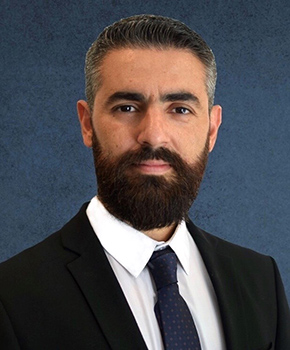Advising Infrastructure Projects in Latin America and the Caribbean

Juan Alberti
International Infrastructure Project Researcher & Consultant
As an economist working as a research assistant at the Inter-American Development Bank in Uruguay, Juan Alberti knew he needed a master’s degree to take the next step in his career. And the UW Master of Infrastructure Planning & Management turned out to be the perfect fit. Here, we talk to the 2014 grad about how the MIPM program gave him the career boost he was looking for.
What do you do in your current role?
I'm an international researcher and consultant on infrastructure development. My work is focused on infrastructure policy analysis and megaproject planning, appraisal and delivery. I currently work as an external consultant for the Inter-American Development Bank. My previous experience was in the public and the private sector and in multilateral institutions (IDB, the World Bank and the UN). Over the past 10 years, I’ve worked on research projects in transportation, energy, water and sanitation, and telecommunications in several Latin American and Caribbean countries: Argentina, Bolivia, Brazil, Chile, Colombia, El Salvador, Jamaica, México, Panama, Paraguay, Peru, Dominican Republic and Uruguay.
How did the MIPM degree help you advance in your career?
In two main ways. The first would be the knowledge I gained in infrastructure systems and infrastructure management. The program gives students several concepts and tools that are useful every day in this kind of job. The second would be the degree itself. To work as an international consultant at a multilateral development bank like the IDB, and to work on more technical and challenging topics, you need to have a master’s degree.
Why did you choose the UW program in particular?
The UW is very well ranked in the most important world and U.S. university rankings. Because I work with international organizations, I wanted to get my degree from a university that had a strong international reputation.
What specific courses in the MIPM program have been the most useful in your career?
The MIPM degree is designed well for professionals working in the public sector and multilateral organizations. The core courses, particularly the strategic planning and policy analysis course and the infrastructure finance course, are useful for helping public institutions prepare for projects in an orderly manner, including weighing alternatives, considering the views of stakeholders, and assessing the funding and finance options. These steps are essential when you’re trying to promote sustainable and resilient infrastructure systems that are capable of delivering a full range of benefits.
I also appreciated the systems courses, particularly the energy, transportation and water sector courses, because they give you a broad understanding of the challenges we’re facing in these specific systems.
What was the online experience like for you, taking the program from Uruguay?
The fact that the MIPM was a nonresidential master’s program was very helpful. I couldn’t have done it in any other format. I didn’t need to leave my job, and I was able to get a master’s degree from a top-tier university in the United States. I actually live in a different time zone and it was never a problem. I could check the videos of the lessons and read the materials at any time.
What was your capstone project, and how did it help your career goals?
For my capstone I studied the pre-investment phase of infrastructure projects in Latin America and the Caribbean. Since that project, I’ve gained considerable expertise in this area. I’ve written for publications and made presentations and seminars in several countries. This expertise has helped show that I’m an infrastructure planning specialist.
What’s next for you?
I'm now a Ph.D. candidate in planning studies at University College London, studying infrastructure megaprojects in Latin America and the Caribbean. I also still work for multilateral organizations as an international researcher and consultant. Once I get my Ph.D., expected in 2022, I’d like to continue my work in Latin America to help countries, multilateral organizations and the private sector deliver successful infrastructure projects that consider both a project management approach (to achieve cost, time and scope objectives) and a more holistic perspective in view of stakeholder requirements.
I also intend to apply for a position as a visiting scholar or visiting fellow at a top-tier university to teach, lecture or perform research in the field of infrastructure megaprojects planning and management.